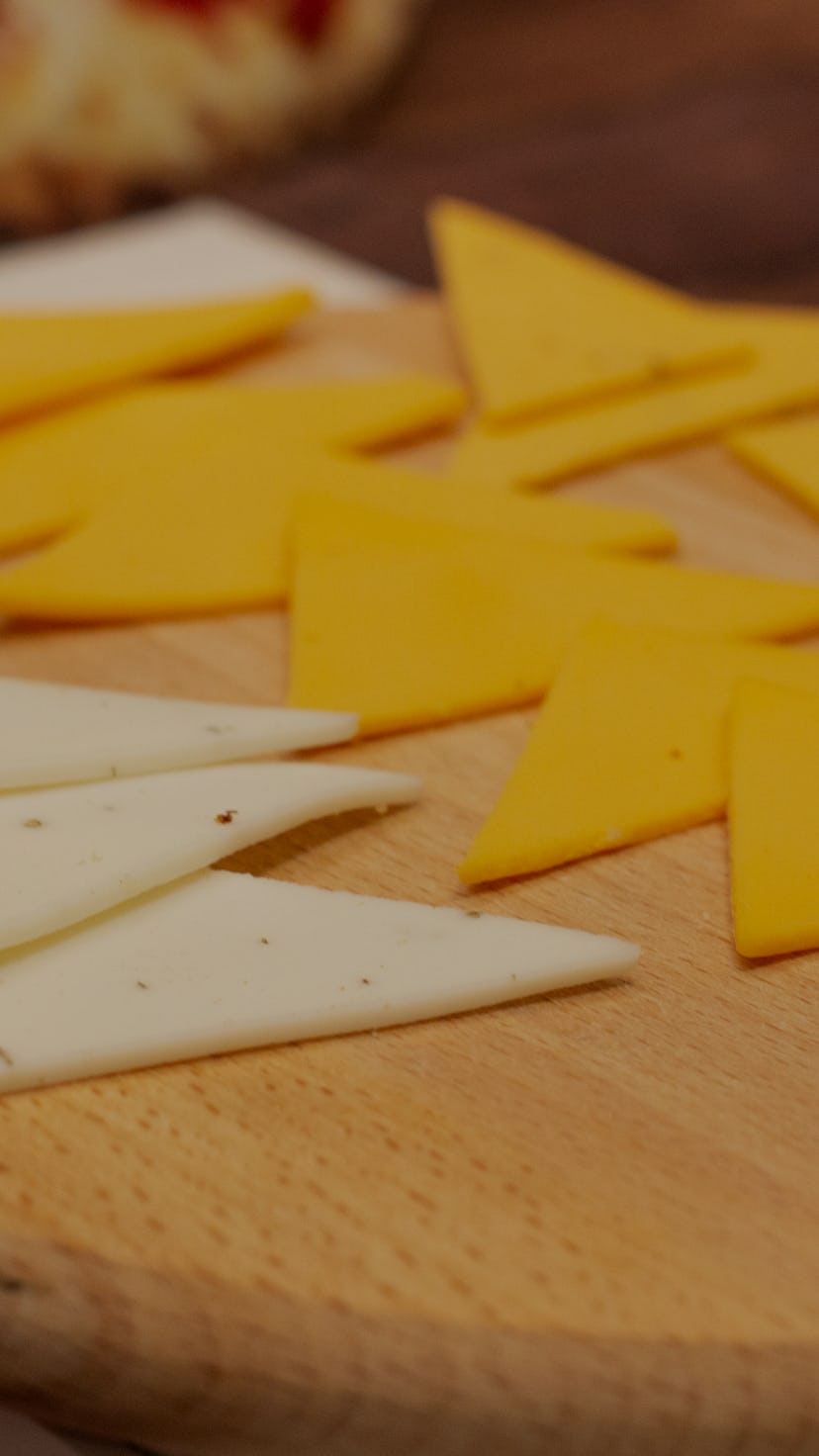The long-awaited evolution of vegan cheese

Vegan cheese usually grosses me out. Bland and rubbery, it makes me thank God I’m not vegan or lactose intolerant so that I still have the option to savor the real thing in all its tangy, rich, gooey decadence. On the other hand, I vastly prefer oat milk to cow’s milk, and lately I’ve been ordering the Impossible Burger as often as I do beef hamburgers. Not only do they help minimize my carbon footprint, they're also positively delectable. Among the major categories of plant-based faux animal products, why does good, cheesy vegan cheese remain so elusive?
First off, whoever decided to try and mimic the magic of real cheese is a brave soul because it consists of a complex balance of texture, physical properties, and flavor, which is tricky to imitate with plant-based ingredients. Approximating caseins, the proteins in cow’s milk that makes dairy cheese stretchy and melty, is an especially big hurdle. Foodies assert that we don’t have a good replacement yet.
These challenges could explain why I’ve had such underwhelming experiences with vegan cheese. A new crop of brands may have begun to turn the tide, though. While they still have a long way to go before they can compete with dairy cheese, they come pretty close to emulating its consistency, and actually taste good.
In the past, vegan cheese has literally left such a bad taste in my mouth that I initially walked right past Good Planet Foods’ vegan grilled cheese samples at the Specialty Food Association’s recent Winter Fancy Food Show in San Francisco, convinced they’d only disappoint me. But then I remembered my 32-year-old stomach can’t handle dairy the way it used to (I'll spare you the graphic details), and decided to give vegan cheese another shot.
Vegan cheese's grossness has become something of a running joke in the food world. Yet, for the longest time, consumers just dealt with it.
Made with Good Planet Foods’ vegan American cheese slices, the sandwiches were — honestly, pretty tasty. The vegan American cheese had the salty, mild sharpness of its dairy counterpart, and, importantly, a surprisingly authentic meltiness, which a rep at the booth attributed to tapioca. The company’s vegan shredded mozzarella cheese, sprinkled atop a slice of cauliflower crust pizza, had the integrity of real cheese as well. At the risk of sounding like a convert, I probably wouldn't have even guessed their cheese was vegan. And while that sounds like a tame compliment, people who have tasted most vegan cheese are probably aghast since fake cheese doesn't have the best reputation.
Companies like Good Planet and Silicon Valley-based New Culture may herald a much-needed makeover for vegan cheese, which is notoriously unsatisfying: thin, with a vaguely plastic flavor, and often runny when melted — not cheesy, in other words. In fact, its grossness has become something of a running joke in the food world. Yet, for the longest time, consumers just dealt with it.
While tapioca mimics dairy cheese’s meltability for Good Planet's products, companies have typically used amino acids to hold fat-rich and water-rich ingredients together, and carrageenan or xanthan gum to keep the oil and water-based ingredients separate, food scientist Jonathan Gold told NPR’s The Salt. This prevents the ingredients from falling apart into a runny mess.
But Adam Hamilton, co-founder of Nuttin Ordinary, told me that in recent years, companies have veered away from using oils, thickeners, and gums, toward fermenting their dairy substitutes — cashew nuts, in Nuttin Ordinary’s case — similar to how milk is fermented to produce cheese. The rationale is that lactic acid, a product of fermentation, would give plant-based products the same sharpness and thickness as it does milk.
Sure enough, Nuttin Ordinary’s line of cashew-based cheeses have the piquancy and spreadability of dairy cream cheese. Treeline Cheese also ferments cashews to produce a tart, velvety French-style soft cheese. I especially enjoyed the subtle bite and smokiness of the chipotle-serrano pepper variety.
Rather than replacing caseins, New Culture has begun making it in the lab. The company’s technique, still being optimized to produce caseins at industrial scales, involves engineering micro-organisms like bacteria to express these proteins, WIRED UK reports. Later, plant-based sugars, vitamins, and fats are added to create a solution similar to milk, which then undergoes fermentation to turn it into cheese. Radman told the New York Times that blind taste tests of the lab-grown cheese and store-bought mozzarella have yielded promising results.
But beyond getting vegan cheese to simply taste cheesy, there remains the enormous task of capturing the characteristics that distinguish one variety of cheese from the next, which is influenced by temperature, the aging process, and a plethora of other variables, making it far more challenging to replicate than milk or meat, per The Guardian. Compare a mild, pillowy mozzarella to a pungent, creamy Roquefort, for example. For vegan cheese to enjoy mass appeal, it needs to mirror these differences and the distinct culinary needs they meet.
Still, the products I tried that day from Good Planet Foods and others restored my faith in vegan cheese had made me optimistic about its future. Rather than spitting them out in disgust, as I was so used to doing with vegan cheese, I’d genuinely enjoyed them.
Then, on my way out of the conference, an irresistibly thick, luscious slab of triple-cream dairy brie caught my eye. I smeared it onto a cracker and took a bite.
Reader, it was a spiritual experience — the rich umami flavor, the smooth, buttery mouthfeel. I imagined my brain’s pleasure centers crackling furiously. Sure, the vegan cheese was good, but this was euphoric. But it's real cheese. It's meant to be.
And this, I thought as I smacked my lips, is why I can never be vegan.